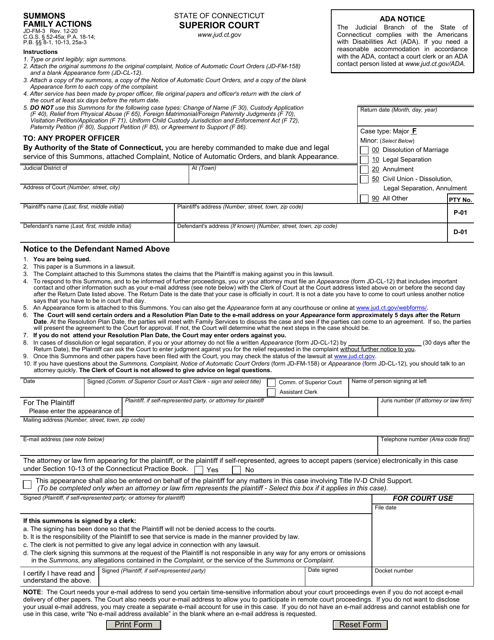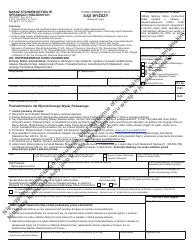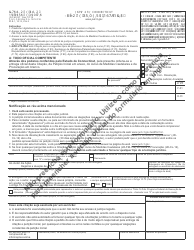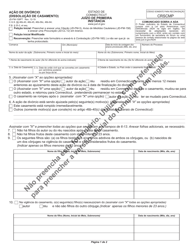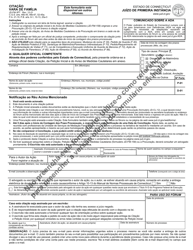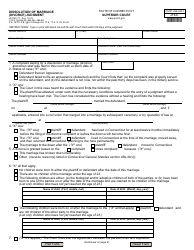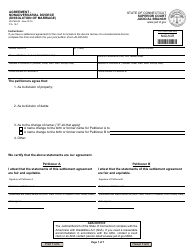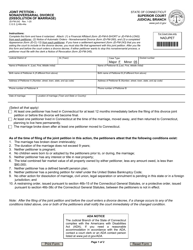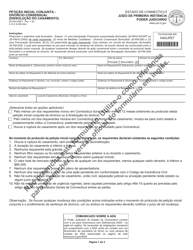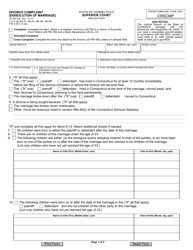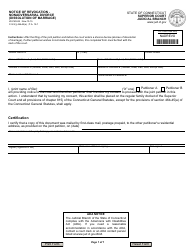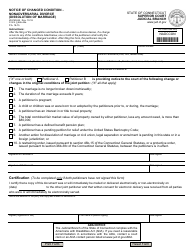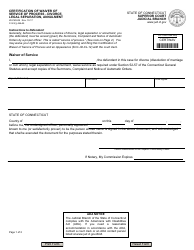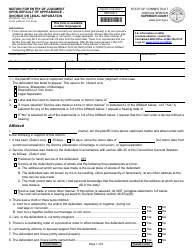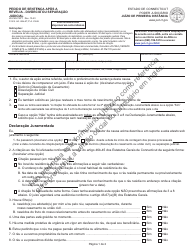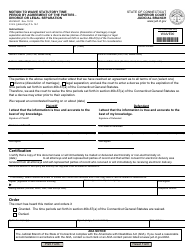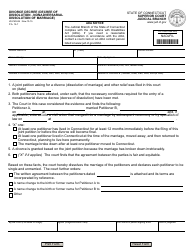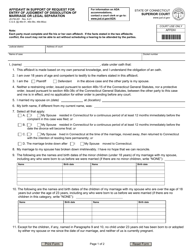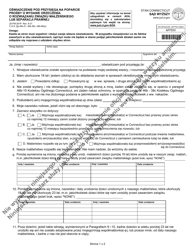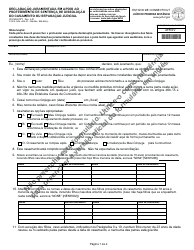This version of the form is not currently in use and is provided for reference only. Download this version of
Form JD-FM-3
for the current year.
Form JD-FM-3 Summons Family Actions - Connecticut
What Is Form JD-FM-3?
This is a legal form that was released by the Connecticut Superior Court - a government authority operating within Connecticut. As of today, no separate filing guidelines for the form are provided by the issuing department.
FAQ
Q: What is a JD-FM-3 Summons?
A: A JD-FM-3 Summons is a legal document used in family actions in Connecticut.
Q: What is its purpose?
A: The purpose of a JD-FM-3 Summons is to officially notify the other party involved in a family action that a legal proceeding has been initiated.
Q: Who can use a JD-FM-3 Summons?
A: Any party initiating a family action in Connecticut can use a JD-FM-3 Summons.
Q: What information does a JD-FM-3 Summons contain?
A: A JD-FM-3 Summons contains information about the court case, such as the names of the parties involved and the court where the case will be heard.
Q: How should a JD-FM-3 Summons be served?
A: A JD-FM-3 Summons must be served to the other party in compliance with the rules of service outlined by the Connecticut court system.
Q: What happens after a JD-FM-3 Summons is served?
A: After a JD-FM-3 Summons is properly served, the other party will be aware of the legal proceeding and can respond accordingly.
Q: Do I need to fill out a JD-FM-3 Summons myself?
A: Yes, you will need to fill out the necessary information on a JD-FM-3 Summons before it can be served.
Q: Can I modify a JD-FM-3 Summons?
A: No, you should not modify a JD-FM-3 Summons. It should be used as is, according to the official form provided by the Connecticut court system.
Q: What should I do if I receive a JD-FM-3 Summons?
A: If you receive a JD-FM-3 Summons, you should carefully read it and take appropriate action within the specified timeframe, such as consulting with an attorney.
Q: Is a JD-FM-3 Summons the same as a complaint or a petition?
A: No, a JD-FM-3 Summons is not the same as a complaint or a petition. It is a separate document used in conjunction with a complaint or a petition in family actions.
Q: Are JD-FM-3 Summons valid in other states?
A: No, JD-FM-3 Summons are specific to family actions in Connecticut and may not be valid in other states.
Q: What should I do if I have questions or need assistance regarding a JD-FM-3 Summons?
A: If you have questions or need assistance regarding a JD-FM-3 Summons, you should contact the clerk's office of the Connecticut court where your family action is being filed.
Q: Can I use a different form instead of a JD-FM-3 Summons?
A: No, you should use a JD-FM-3 Summons, as it is the official form required by the Connecticut court system for family actions.
Q: How much does it cost to file a JD-FM-3 Summons?
A: The cost to file a JD-FM-3 Summons may vary depending on the court fees set by the Connecticut court system. You should inquire about the specific costs when filing.
Q: Can I file a JD-FM-3 Summons electronically?
A: The availability of electronic filing for a JD-FM-3 Summons may vary depending on the court rules and procedures of the specific Connecticut court where your family action is being filed. You should check with the court for electronic filing options.
Q: What should I do if I make a mistake on a JD-FM-3 Summons?
A: If you make a mistake on a JD-FM-3 Summons, you should consult with an attorney or contact the clerk's office of the Connecticut court where your family action is being filed for guidance on how to correct the mistake.
Q: Can I use a JD-FM-3 Summons for non-family-related legal actions?
A: No, a JD-FM-3 Summons is specifically designed for family actions in Connecticut and should not be used for other types of legal actions.
Q: How long is a JD-FM-3 Summons valid?
A: The validity of a JD-FM-3 Summons may vary depending on the specific court rules and procedures of the Connecticut court where your family action is being filed. You should refer to the instructions provided with the form or consult with the court for the applicable timeframe.
Q: Can I use a JD-FM-3 Summons for child custody cases?
A: Yes, a JD-FM-3 Summons can be used for child custody cases as part of the overall family action in Connecticut.
Q: How should I prepare for a court hearing after filing a JD-FM-3 Summons?
A: To prepare for a court hearing after filing a JD-FM-3 Summons, you should gather all relevant documents and evidence, consult with an attorney if needed, and be prepared to present your case in court.
Q: Can I submit additional documents together with a JD-FM-3 Summons?
A: In some cases, additional documents may need to be submitted together with a JD-FM-3 Summons, depending on the requirements of the specific Connecticut court where your family action is being filed. You should check with the court for any additional document requirements.
Q: What happens if the other party does not respond to a JD-FM-3 Summons?
A: If the other party does not respond to a JD-FM-3 Summons within the specified timeframe, the court may proceed with the family action based on the information provided by the initiating party.
Q: Can I use a JD-FM-3 Summons for divorce cases?
A: Yes, a JD-FM-3 Summons can be used for divorce cases as part of the overall family action in Connecticut.
Q: Can I use a JD-FM-3 Summons for child support cases?
A: Yes, a JD-FM-3 Summons can be used for child support cases as part of the overall family action in Connecticut.
Q: Can a JD-FM-3 Summons be used for spousal support cases?
A: Yes, a JD-FM-3 Summons can be used for spousal support cases as part of the overall family action in Connecticut.
Q: What is the deadline for serving a JD-FM-3 Summons?
A: The deadline for serving a JD-FM-3 Summons may vary depending on the specific court rules and procedures of the Connecticut court where your family action is being filed. You should refer to the instructions provided with the form or consult with the court for the applicable deadline.
Q: Can I use a JD-FM-3 Summons if I am representing myself without an attorney?
A: Yes, you can use a JD-FM-3 Summons if you are representing yourself without an attorney in a family action in Connecticut.
Q: What is the court case number used for on a JD-FM-3 Summons?
A: The court case number on a JD-FM-3 Summons is used for identifying and tracking the specific family action case within the Connecticut court system.
Q: What is the difference between a JD-FM-3 Summons and a JD-FM-5 Appearance?
A: A JD-FM-3 Summons is used to officially notify the other party of a family action, while a JD-FM-5 Appearance is used by the other party to indicate their intention to participate in the legal proceeding.
Q: Can a JD-FM-3 Summons be served by mail?
A: In some cases, a JD-FM-3 Summons may be served by certified mail with return receipt requested, in compliance with the rules of service outlined by the Connecticut court system.
Q: What information should I provide when completing a JD-FM-3 Summons?
A: When completing a JD-FM-3 Summons, you should provide accurate and complete information about the parties involved, the court case, and any other required details as specified on the form.
Q: Can I use a JD-FM-3 Summons for visitation cases?
A: Yes, a JD-FM-3 Summons can be used for visitation cases as part of the overall family action in Connecticut.
Q: Can I file a JD-FM-3 Summons before filing a complaint or a petition?
A: No, you should generally file a complaint or a petition before filing a JD-FM-3 Summons, as the summons is used to notify the other party of the legal proceeding initiated by the complaint or petition.
Q: Are there any fees associated with serving a JD-FM-3 Summons?
A: The fees associated with serving a JD-FM-3 Summons may vary depending on the specific court rules and procedures of the Connecticut court where your family action is being filed. You should inquire about the specific fees when serving the summons.
Q: What should I do if I cannot locate the other party to serve a JD-FM-3 Summons?
A: If you cannot locate the other party to serve a JD-FM-3 Summons, you should consult with an attorney or contact the clerk's office of the Connecticut court where your family action is being filed for guidance on alternative methods of service.
Q: Can I submit a JD-FM-3 Summons via email?
A: The acceptance of a JD-FM-3 Summons via email may vary depending on the court rules and procedures of the specific Connecticut court where your family action is being filed. You should check with the court for email submission options, if available.
Q: Can I use a JD-FM-3 Summons for restraining orders?
A: No, a JD-FM-3 Summons is not typically used for restraining orders. There are separate forms and procedures for obtaining a restraining order in Connecticut.
Q: Can a JD-FM-3 Summons be served by a private process server?
A: Yes, a JD-FM-3 Summons can be served by a private process server, as long as they comply with the rules of service outlined by the Connecticut court system.
Q: Can I fax a JD-FM-3 Summons for service?
A: The acceptance of a faxed JD-FM-3 Summons for service may vary depending on the court rules and procedures of the specific Connecticut court where your family action is being filed. You should check with the court for fax submission options, if available.
Q: What should I do if I receive multiple JD-FM-3 Summons for the same case?
A: If you receive multiple JD-FM-3 Summons for the same case, you should consult with an attorney or contact the clerk's office of the Connecticut court where your family action is being filed to clarify the situation and ensure proper handling.
Q: Can I use a JD-FM-3 Summons for modification cases?
A: Yes, a JD-FM-3 Summons can be used for modification cases related to family actions in Connecticut.
Q: Can a JD-FM-3 Summons be served by a sheriff?
A: Yes, a JD-FM-3 Summons can be served by a sheriff or other authorized law enforcement officer, as long as they comply with the rules of service outlined by the Connecticut court system.
Form Details:
- Released on December 1, 2020;
- The latest edition provided by the Connecticut Superior Court;
- Easy to use and ready to print;
- Quick to customize;
- Compatible with most PDF-viewing applications;
- Fill out the form in our online filing application.
Download a fillable version of Form JD-FM-3 by clicking the link below or browse more documents and templates provided by the Connecticut Superior Court.
